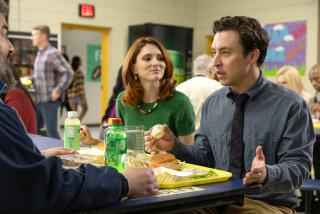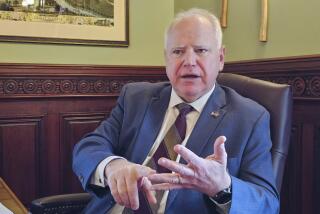The National Teacher of the Year on what makes a great teacher
The class clown from Mr. Gadberry’s high school art class has made good — and how. Rebecca Mieliwocki teaches seventh-grade English at Luther Burbank Middle School in Burbank — but not next year. Instead, she’ll be on the road as the National Teacher of the Year. It took her a long time to get to the classroom — she once worked as a floral designer, doing the flowers for Elizabeth Taylor’s private jet — and eventually to the White House, where a fellow teacher, President Obama, crowned her as a national teaching treasure. Before she takes off, Mieliwocki is speaking at commencement at her teaching alma mater, Cal State Northridge — and right here.
With all the tests kids face, some parents and teachers say there’s only room to “teach to the test.”
I really disagree. Those tests are so narrow that if you tried to teach kids just those things, they’d have a warped and weird education. The tests are a target I hope kids can hit, but I need to teach the whole back-story, everything they need to know: how to communicate, how to write clearly, how to stand up and sound intelligent, how to think critically. The test — my kids say, “I can do that.”
But do some teachers teach differently since No Child Left Behind and Race to the Top?
I see the narrowing, staying so close to that test and the skills in that test. I think administrators do teachers a grave disservice when they make them feel that’s what they should be doing. It is a little piece of the picture.
My best teachers might not get hired today. They were great, but they had some unorthodox teaching techniques.
You look at the new legislation, you listen to all the people who don’t work with kids and are telling you what to do, and you nod and then you go to your classroom and dream up something amazing for kids that has very little to do with what you were just told you better do or else. That’s what great teachers do: They’re revolutionary. If we change to fit what somebody else says kids need and that person works in an office and hasn’t seen a kid since 1992, we would not be giving kids what great teachers know they need.
Teachers are getting hammered politically.
I feel very battered. There’s so much pressure on teachers to rescue what everyone paints as a sinking ship. We must be the ones who either caused it or have to fix it. Just doing the job is hard enough. But then to be blamed for everything that’s wrong with education — it’s upsetting, it’s disheartening. Why would anybody enter a profession where the job is going to take everything out of you, the news media will be against you, parents may be against you, politicians may be against you? I worry about the future of the profession.
When a child has been sullen and disconnected and you find out mom and dad split up and you walk that kid to the counselor, do another hour of consoling, then go home and read an article calling teachers lazy, poorly prepared, unprofessional — it breaks my heart. I think, how can I be the problem?
How did that happen?
I think people need reassurance that their tax dollars aren’t getting wasted, that something good is happening [at school] that can be measured. I understand that ferocious need, coupled with falling test scores, with the difficulty in removing teachers who aren’t performing and the unions’ unwillingness for a long time to look at how to change things — all those things made us ripe for the picking. Or the kicking.
Kids come to school from broken homes, not knowing left from right, not having a place to do homework, and teachers are forced to act as parents.
The priority has to be on learning. I have 52 minutes with kids every day. I think good teaches are almost like Zen masters: They just swat away distractions. But do I spend my lunches helping kids with their homework? Yes. Do I make sure kids have a ride home? Yes. Do I have a kid who’s worn the same sweater for three weeks and it’s dirty and I take it home and launder it? Yes. I’m seeing more hungry, hungry kids; it’s troubling. I’m already spending half my paycheck on teaching supplies. Now the rest of it is going to sandwiches and granola bars and lunch money for kids who are hungry. That statistic that the average teacher spends $400 a year [on students] — I laughed. It’s much closer to $2,000, $3,000. I keep track.
Your parents were both teachers, but you resisted.
I went to Cal Poly San Luis Obispo thinking I’d go on to law school. Once I got [through] college, I felt some obligation to get off my parents’ gravy train. The idea of three more years of [law school] — I wasn’t going to ask them to pay for that.
My first job was a publishing company in Boyle Heights, a compositor who put textbooks together. It was interesting, but it didn’t call to me. On Saturdays I worked at a flower shop — that’s the job I had through college. [Eventually] I went to work for Mark’s Garden in Studio City — really exciting work, the Emmys, celebrity weddings. I decorated the Schwarzeneggers’ house for Christmas before he was governor, designed Elizabeth Taylor’s flowers for her airplane. It was fun, very L.A. But I felt, I can’t do this the rest of my life. I made a list of everything I wanted in a job, being a project coordinator, being creative and in control of things I created, and when I showed my husband the list, he cracked up. He said, “I know you don’t want to hear this, but you’re supposed to be a teacher.”
My parents were both teachers, and I spent a lot of time in my mom’s classroom. I loved playing teacher. The mimeograph machine was amazing: hand-cranking the copies and that purply blue color and the smell — I just loved that. As soon as I came to my own classroom and began to run it, it felt so natural.
Do you have problems with the teacher seniority system?
I teach with a young woman named Stefanie. In her first three years, she was pink-slipped every single year due to budget cuts. Stefanie is phenomenal. She does more in one day than many teachers can accomplish in a week. She gets amazing results. What’s more, kids, parents and her colleagues adore her. She’s the teacher every family wants their child to have. And yet, because she’s the newest one in, she’s the first to get cut, while across campus, there are teachers who’ve taught for 20 years and who haven’t had a new or engaging lesson in as many years. How can we justify firing the best and the brightest again and again while we let teachers who are phoning it in keep their jobs without question? We can’t risk losing these highly qualified teachers simply because they had the misfortune to be new.
Is a good teacher a performer?
Oh definitely. You cannot be afraid to stand up in front of 30 really harsh critics. And inside of two minutes, they’ll let you know: They’ll put their heads down on the desk, almost give you a raspberry if your lesson stinks. So you have to be willing to take those risks every day.
Is a good class a fun class?
That’s a child’s perspective, and I don’t ever want to be swayed by that. I want to challenge kids, and when you’re learning something new, that element of exhilaration can be misconstrued as fun, and that’s fine with me. There are things in life that deserve to be called fun; school should be something different. It should be challenging. You should experience success and failure.
What do you think of charter schools?
I see charter schools, magnet schools, private schools, the KIPP schools — I’m excited to know this many people are hard at work to transform education. But I’d rather we put all that time, money and energy into strengthening a system we already have, that at one time was the envy of the planet. I teach in a school that’s doing what I think charter schools are trying to do. Why reinvent the wheel if the wheel works? We’ve just got to get them all rolling in the right direction.
How about social promotion?
It’s got to stop. I think that we pass kids along and pass them along and it makes the burden for a teacher like me that much greater. We can’t keep trying to play catch-up until a kid is in 12th grade; we just don’t have the resources.
Do we need a longer school day or a longer school year?
Longer, maybe, but it’s got to be better. I think we need a real change in how kids get educated. We walk into schools that look prehistoric. And yet when my kids leave me, they get on laptops and phones that have more power than anything in my classroom some days. It’s teachers who go, wait a minute, I need to put technology in my kids’ hands to facilitate the lessons I want to teach.
I envision a hard-core [academic] bloc — four hours of math, science, social studies, English in the morning — then a two-hour fitness block; I’ve never seen so many kids who need exercise. And then an afternoon of hands-on enrichment, kids taking computers apart and putting [them] back together, kids filming movies, kids cooking. There has to be part of the day where they are learning by doing.
But in spite of all the problems …
I really love it. They’ll carry my cold, dead body out of that seventh-grade classroom.
This interview is edited and excerpted from a taped transcript. For more of the conversation, go to latimes.com/pattasks.
More to Read
A cure for the common opinion
Get thought-provoking perspectives with our weekly newsletter.
You may occasionally receive promotional content from the Los Angeles Times.











